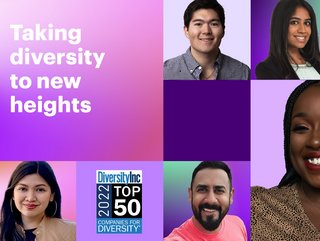How Accenture is leading the charge on diversity, inclusion

When it comes to championing diversity and inclusion, Accenture is leading the global charge, taking pioneering and consistent steps to create an inclusive and equitable culture.
And recognition for the global professional services firm’s commitment to diversity and inclusion continues to come thick and fast, with the latest accolade positioning Accenture as the number one most diverse and inclusive company in the US – taking top spot in DiversityInc’s Top 50 Companies for Diversity list.
This follows the naming of Accenture high on the list of renowned DE&I indexes, including being the highest-scoring company on the Bloomberg Gender-Equality Index, number three on the Refinitiv Diversity & Inclusion Index, number six on Fortune 100 Best Companies to Work For, and 15 consecutive years on the Human Rights Campaign’s Corporate Equality Index.
Such recognition is unsurprising when you consider that Accenture, which a 699,000-strong global workforce, became the first professional services company, in 2016, to publish comprehensive data about its US workforce, and every year since, has shared its workforce composition by gender, race and ethnicity, persons with disabilities and veterans.
Accenture makes inclusion, diversity and equality part of who they are and how they work
According to Accenture, their success in cultivating richness in diversity starts with every single of its employees and clients with the unique voices and experiences of its people forming the powerful collective that makes inclusion, diversity and equality part of who they are and how they work.
The aim, says Jimmy Etheredge, CEO of Accenture North America, is to make Accenture “a place where we truly care about each other, where everyone has a voice and where everyone can grow and learn”.
So, how exactly is Accenture able to pull off a truly diverse workforce? And what initiatives has it pioneered and investments made to try to truly level the playing field?
- Combating racism The company continues to make progress toward its 2025 goals to increase African American, Black, Hispanic American and Latinx representation among its workforce and its leadership. To foster inclusion and belonging, Accenture’s anti-racism training and Building Bridges discussions help educate and create safe spaces to talk about race in the workplace, and vibrant employee resource groups help strengthen the company’s culture of equity. To date, 97% of our people in the US, Canada, Ireland, South Africa and the UK have completed mandatory training on identifying, speaking up and reporting racism.
- Pay equity Accenture has dollar-for-dollar, 100% pay equity for women compared to men in every country it operates. Likewise, by race and ethnicity, Accenture has dollar-for-dollar, 100% pay equity in countries where such data is collected (the US, South Africa and the UK).
- Gender equity Today, more than 300,000 women work at Accenture globally, representing 46% of the workforce, 47% of new hires and 32% of executive leadership.
- LGBTIQ+ visibility All Accenture people have access to same-sex or equivalent benefits where legally allowed and the global Ally program engages more than 120,000 members.
- Disability champions Accenture’s Accommodation Support Tool helps people easily ask for assistive technology, flexible work arrangements, sign language interpreters, screen readers and more. The global, first-of-its-kind tool is currently available in 39 of Accenture’s operational countries, with more being added. Our Disability Inclusion Champion network of more than 35,000 members worldwide brings our people together regularly to collaborate, network and support the community.
- New career pathways For fiscal year 2022, Accenture plans to fill 20% of its entry-level roles in the US from its Apprenticeship Program – a learn-and-earn model that does not require a four-year college degree and provides apprentices with market-based wages and comprehensive benefits while building cutting-edge skills needed for a successful career.






